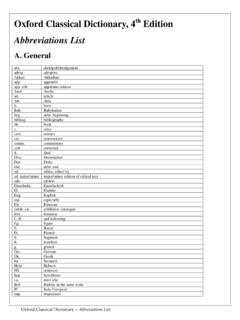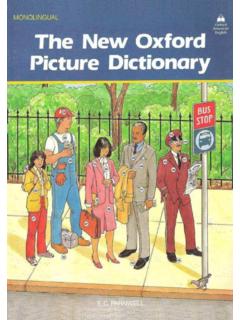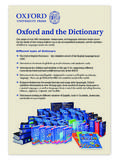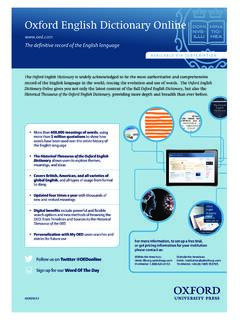Transcription of THE OXFORD LATIN DICTIONARY A HISTORICAL …
1 THE OXFORD LATIN DICTIONARY : A HISTORICAL INTRODUCTIONThe first fascicle of OLD (A Calcitro), published on 2 May 1968, must have surprised some readers, since neither on its rich red soft covers nor on its title page was an editor named, though a List of Edi-torial Staff on page vii set out the names and working dates of seventeen scholars. The list followed a short Publisher s Note which gave a sketch of the DICTIONARY s history. This Note was, as will emerge below, as much a diplomatic as a HISTORICAL statement, and is itself, over forty years later, part of the history of the DICTIONARY . My own account, which involves reading between the lines of the note, will aim inter alia to explain why it was so much less expansive than the preface to the first fascicle of the ninth edition of Liddell and Scott s Greek English Lexicon (1925),hardly more than a page, to the latter s history of LATIN English and English LATIN dictionaries goes back to about 1500, the former concentrating on hard words for which English speakers were thought to need special The universality of LATIN as a medium of communication in early modern Europe meant that most dic-tionaries of both classical languages were written in It was only with the rise of nationalism and vernacular publishing in the eighteenth century that this pattern began to be I.
2 J. G. Scheller s LATIN German DICTIONARY of 1783, which served as the ancestor of several nineteenth-century LATIN English dictionaries, belonged to this new movement. It was drawn on by Wilhelm Freund for his own LATIN German DICTIONARY (1834 45), which was later translated into English by the American Ethan Andrews (1850). Andrews s DICTIONARY in turn was enlarged and adapted by two other Americans, the lawyer Charlton T. Lewis and the classical scholar Charles T. Short, whose large LATIN English dic-tionary was published by Harper Bros of New York in 1879 as Harper s LATIN The book was published simultaneously in Britain as A LATIN DICTIONARY by OXFORD University Press, who printed it from plates shipped over from New York. This unusual procedure was adopted after the failure of an OXFORD project. Four years earlier, in 1875, Henry Nettleship of Lincoln College, OXFORD , later to be Corpus Professor of LATIN , and John Mayor, Kennedy Professor of LATIN at Cambridge, had been commissioned to assemble a book based on a fresh reading of the sources; but Mayor failed to deliver, and Nettleship was unable to cope by himself.
3 The Press did have stocks of an earlier DICTIONARY , John Riddle s 1835 translation of Scheller s LATIN German original, but they may have felt this to be out of date, and it was also a very large and expensive So Harper s LATIN DICTIONARY (its American title) became Lewis and Short s LATIN DICTIONARY . The story of OLD begins in 1921, when Mayor s pupil Alexander Souter (1873 1949), apparently at the invitation of the Press s Secretary R . W. Chapman, submitted a memorandum complaining of the deficiencies of Lewis and Short and urging OUP to commission a comprehensive 1 Liddell and Scott was published by OUP in ten fascicles between 1925 and 1940. In the case of both books, evidence contained in fascicles has been destroyed by the stripping of their covers and prelims for rebinding as single For the context, see H. Sauer, Glosses, glossaries and dictionaries in the medieval period , in A.
4 P. Cowie (ed.), The OXFORD History of English Lexicography ( OXFORD : OUP, 2009), J. Considine, Dictionaries in Early Modern Europe: Lexicography and the Making of Heritage (Cambridge: CUP, 2008).4 L. Febvre and Martin, The Coming of the Book: The Impact of Printing 1450 1800 (London: New Left Books, 1976), 320 Short was appropriately named: he supplied material only on the letters A C, and B and C were then lost by Harpers, so that the book as published was almost entirely assembled by Lewis, who was also responsible for the abridged versions which followed. See F. J. Sypher, A history of Harper s LATIN DICTIONARY , Harvard Library Bulletin, 20 (1972), 349 Riddle had used the third edition of Scheller s DICTIONARY (1804 5), which was published in five Memorandum on Lewis and Short s LATIN DICTIONARY , 20 June 1921: OUP Archive, PBEd12940. In his Hints on Translation from LATIN into English (London: SPCK, 1920), 9, Souter had complained that Lewis and Short suffered from compression, poor English equivalents, and utterly untrustworthy statements on the extent of usage of particular words.
5 According to J. M. Wyllie, Souter had been sending OUP notes on errors in the DICTIONARY since about 1897: Wyllie, Vision of Truth ..: Book I, The Clarendon Press ( OXFORD : The 1008/11/2011 13:57 OXFORD University Press 2015xi The OXFORD LATIN DICTIONARY : a HISTORICAL introductionSouter, who had held the OXFORD chair of New Testament Greek, was now Professor of Humanity ( LATIN ) at Aberdeen. He had produced a pocket lexicon of New Testament Greek in 1916. Like his master Mayor, Souter was fond of pointing out to his bewildered classes the inadequacies of Lewis and The first result was a commission in 1924 to produce a concise LATIN DICTIONARY , on which Souter was working in 1929 when the Assistant Secretary of OUP, Kenneth Sisam, reviewed the Press s range of dictionaries. The OXFORD English DICTIONARY had been completed in the previous year, while the revision of Liddell and Scott s Greek English DICTIONARY had been under way for nearly thirty years, and the fascicles of the new edition had been appearing since OED had been assembled de novo on the basis of a large-scale reading programme; the new Greek lexicon combined revision with fresh reading: which strategy should be adopted for LATIN ?)
6 The revision of Lewis and Short proposed by Souter in his 1921 memorandum, Sisam concluded, was out of the question, as the book was not OUP s property,the Press printed and sold it, but for North American sales paid 10 per cent royal-ties to the American Book Company, successors to Harper Bros. An entirely new DICTIONARY was thus desirable on both scholarly and economic grounds. The other presence in the field was that of the The-saurus Linguae Latinae, a vast project first proposed in the early nineteenth century which after several false starts had got under way in 1894, supported by five German and Austrian Its first fascicle appeared in 1900, when Charles Cannan, then Secretary to the Delegates of the Press, won-dered whether OUP should plunder or translate it , but it was knocked off course by two world wars; in 2010, having skipped over the letter N because of its difficult entries (including non), it reached the end of the letter P.
7 The forbidding scale and slow progress of the Thesaurus were in a sense reassuring, since they suggested that it could be discounted as a competitor to a single-volume DICTIONARY . An abridged version had begun to appear in 1912, and might have dissuaded OUP from embarking on their own book, but the First World War intervened, its senior editor died, and the Press was left with a clear Sisam consulted Souter, A. E. Housman (Professor of LATIN at Cambridge 1911 36, and also famous as the author of A Shropshire Lad), and others on candidates for editorship of the new book. Housman replied:I do not think that a new LATIN DICTIONARY should be undertaken till the German Thesaurus is complete, as the duplication of labour would be cruel and wicked. But to remove the actual errors in Lewis and Short, though no light task, should be practical; and if only the false quantities were corrected, and rela-tive amended to interrogative in the hundreds of places where it should be, that would be something.
8 I cannot say that I know a young lexicographer. W. B. Anderson, Souter are names which suggest Souter himself sent a list of three names, headed by his own; he gave his age (56), but added help-fully that he came from a long-lived family. The other two names were those of his brother-in-law W. B. Anderson (also named, as we have seen, by Housman), and his ex-pupil Ronald Burn, who later Barras Seer, 1960), 81. For an exuberantly detailed account of the assembly of OLD, see J. G. Henderson, A1 ZYTHUM: DOMIMINA NUSTIO ILLUMEA, or Out with the OLD (1931 82) , in C. A. Stray (ed.), Classical Dictionaries: Past, Present and Future (London: Duckworth, 2010), 139 76. 8 On Souter, see R . J. Getty, Alexander Souter , Proceedings of the British Academy, 38 (1952), 255 68. 9 The revision was edited by (Sir) Henry Stuart Jones, with the help of Roderick McKenzie; its fascicles were collected in 1940 in two volumes, and later in a single volume.
9 10 For the history of TLL see D. Kr mer (ed.), Wie die Bl tter am Baum, so wechseln die W rter: 100 Jahre Thesaurus linguae Latinae (Stuttgart/Leipzig: Teubner, 1995); K. Coleman (ed.), The Thesaurus Linguae Latinae and Classical Scholarship in the 21st Century: Five Perspectives , Transactions of the American Philological Association, 137 (2007), 473 507; C. Flow, Der Spiegel der Zeit: the Thesaurus Linguae Latinae and the story of modern LATIN lexicography , AB dissertation, Harvard University, 2010. Souter had sent material to the Thesaurus from its earliest days: Getty, Souter ( ), F. Vollmer and E. Bickel, Epitome Thesauri Latini I: A Aedilis (Leipzig: Teubner, 1912), planned to be completed in four volumes. Vollmer died in Housman to R . W. Chapman, 15 November 1929, OUP Archive, PBEd 12941. The letter is given here in full, having been discovered too late to be included in Archie Burnett s The Letters of A.
10 E. Housman ( OXFORD : OUP, 2007). Anderson succeeded Housman in the Cambridge LATIN chair after the latter s death in 1936. See also T. Keeline, A. E. Housman and the Thesaurus Linguae Latinae , Housman Society Journal, 36 (2010), 64 1108/11/2011 13:57 The OXFORD LATIN DICTIONARY : a HISTORICAL introduction xiiworked on the revision of Liddell and In 1933 Souter was invited to edit the DICTIONARY , with the help of another ex-pupil, James McLeod Wyllie. Souter was to work from Aberdeen, coordinat-ing the work of volunteer readers (who eventually numbered more than fifty), while Wyllie was to be based in OXFORD . Wyllie had been hired to work on the OED Supplement in 1929: this was to be pub-lished during 1933, so he would soon be available, and he was already seen by the Press as a promising young scholar who had absorbed the principles of OXFORD lexicography from William Craigie of the The OLD project was thus conceived of from the beginning in relation to other OUP diction-aries.









